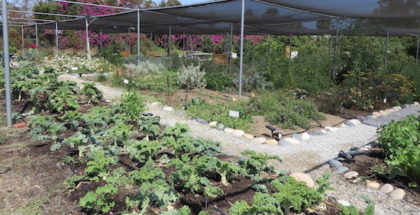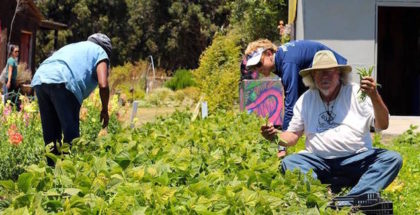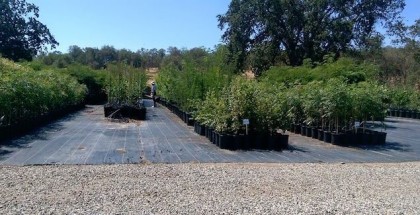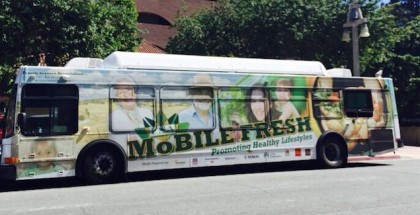Food Security
Coalition Fights Food Waste to End Hunger in Orange County, CA
January 9, 2017 | AJ HughesWhen Santa Ana, California pediatrician and Orange County Public Health Officer Eric Handler ran into Mark Lowry of the Orange County Food Bank some years ago, he had two questions for him:
- Do you have enough food in your food bank?
- If we captured all food waste, could we end hunger in Orange County?
Lowry’s answer to the first question was no, and his answer to the second question was yes. This interaction led to the formation of the Waste Not OC Coalition in 2012.
With an overarching goal to eradicate hunger in Orange County, the Waste Not OC Coalition recovers food by connecting restaurants and grocery stores with food recovery agencies. It distributes that food by connecting people in need with food pantries. It also educates donors, recipients and the general public about the importance of food donation and how to safely handle donated food. Read More
Vacant Lot Turned Urban Farm Transforms Community, Increases Food Access
January 2, 2017 | Maria Hsin
The Growing Experience (TGE) is a seven-acre urban farm in North Long Beach that is located on a previously vacant lot. Photo Credit: Maria Hsin
On a recent Friday morning, eggs, figs and other vegetables and fruits were being placed on the back of a small truck destined to be sold at a farm stand in the parking lot outside of the Senior housing block in the Carmelitos Public Housing Community in Long Beach, CA. The produce was grown on site at The Growing Experience (TGE), a seven-acre urban farm in North Long Beach that is located on a previously vacant lot that is part of the same housing complex.
The TGE urban farm is unique in that it is owned and operated by the Housing Authority of the County of Los Angeles (HACoLA), which manages 3,229 units of public and other affordable housing for the county’s Public Housing program. Read More
For Homeless in Santa Cruz, CA, Garden Project Offers Hope, Stability, and Jobs
December 26, 2016 | Charli EngelhornTalking about the homeless population of America is popular these days. And yet fixing the situation seems, to many, an impossibly overwhelming task. Others are proving it’s not. The Santa Cruz Homeless Garden Project (HGP) uses sustainable agriculture as the springboard to a safer, productive and more hopeful life for many. The agriculture and gardening training provided to the homeless of Santa Cruz County through the project has culminated in both jobs and permanent housing for its trainees.
“We find people that express much greater degrees of well being after they are with us for a year, whether it’s in their diet, in their sense of self, in their ability to set goals and achieve them, in how connected they feel to the community,” says Darrie Ganzhorn Executive Director of the Homeless Garden Project. Read More
SoCal Seed Saving Library Seeks to Establish Generations of Seed Shepherds
September 14, 2016 | Karen Briner
David King, founder and chair of the Seed Library of Los Angeles (SLOLA). Photo Credit: Karen Briner.
David King grew up in Kansas where, despite being very poor, his family ate very well because they grew their own food on his grandfather’s three acres. This was where David got his first taste of seed saving.
As founder and chair of the Seed Library of Los Angeles (SLOLA), David’s been committed to teaching others how to save seeds. He says he was spurred into action to start the library in 2010, when the Obama administration approved GMO sugar beets.
“It was just too much,” he says. “I lost it.”
So on a cold, drizzly day in December of 2010, he held the first meeting of SLOLA. About 45 people showed up, more than he had expected, and 15 of the people who attended that first meeting are still active members today. As stated on their website, SLOLA was founded with the idea of enabling all who live in the Los Angeles area to have access to nutritious, pesticide-free, non-GMO food. Read More
Four Inland Empire Community Garden Programs Working to Make a Difference
June 30, 2016 | AJ Hughes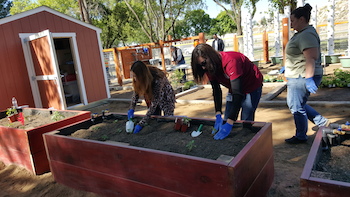
The City of Perris’s Green City Farm. Photo courtesy of the City of Perris.
Community-based agriculture is increasing across the Inland Empire(IE) as more community gardens and the programs related to them are being established. As outlined below, these efforts include many new farm plots where residents are growing their own food, learning new skills and gaining food system awareness. But the people establishing these gardens are going further than just turning bare dirt into growing grounds. They are implementing ancillary programs as well, thereby adding even greater value to their communities. Each of these various enterprises benefits their local cities and neighborhoods by increasing access to healthy and fresh foods, as well as providing employment, educational opportunities and a greater sense of community to everyone involved in their construction, day-to-day upkeep and expansion.
Incredible Edible Community Garden – Upland
A few years ago, Mary Petit and Eleanor Torres decided to tackle the problem of food insecurity in their local Upland area by working at a local community garden. Petit looked for an existing community garden with no success, so she and Torres began their own and named it the Incredible Edible Community Garden. Read More
Grocery Store on Wheels Tackles Food Access Challenges in Riverside and San Bernardino
April 18, 2016 | Annamarie Sysling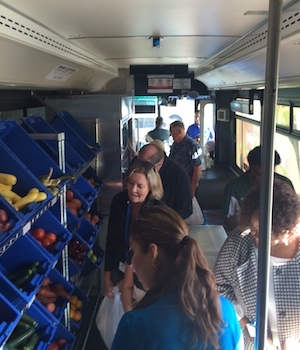
Mobile Fresh FSA customers shop for fresh and healthy food in Riverside. (Photo courtesy of Joey Romero, Program Director for Mobile Fresh FSA)
Increasing access to fresh and healthy food in “food deserts,” defined as low-income urban areas where a substantial number or share of residents has very limited access to a large grocery store or supermarket, requires creativity, resourcefulness and drive. And it is drive that resulted in the creation of a grocery store on wheels that enables Moreno Valley-based Family Service Assocation (FSA) to tackle trenchant food access problems in Riverside and San Bernardino, two of the largest counties in the United States.
Family Service Association (FSA), an organization that builds community “one family at a time, through compassion, advocacy and comprehensive model services, fostering self-sufficiency and sustainable impacts,” launched mobile fresh market pilot project, Mobile Fresh, in December 2013. Program Director Joey Romero says at the time, Mobile Fresh was run out of a van, and FSA advertised the new mobile grocery service at some of its offices and local child care and community centers. “We parked, put a table out there and put out some fresh fruits and vegetables,” recalls Romero. Read More


